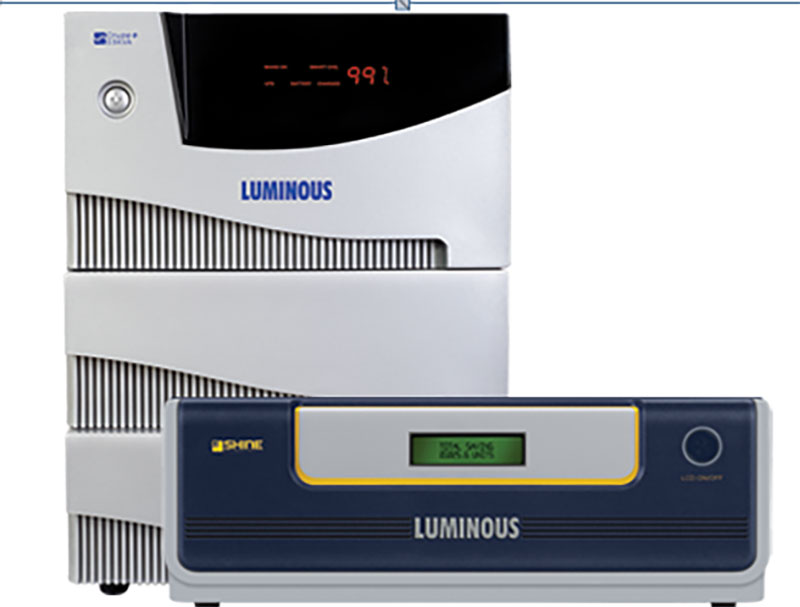 Solar Inverters
Solar Inverters
Solar Inverters: Here’s All That You Must Know
Indian homes are endowed with vast amounts of solar energy as most parts in India receive 4-7 kWh per sq. m per day. This makes Indian homes a potential fit for installing solar power systems and harnessing the solar energy produced by the Sun. If you, too, have been thinking of installing a solar power plant on your property but have little to no knowledge about solar inverters then here’s a post that will help you get a basic idea about what is a solar inverter, how it works and the kinds of solar inverters that are available in the market. So without much ado, let’s begin.
What is a Solar Inverter?
A solar inverter is the heart of a solar power system.It performs several important functions such as it converts the DC power received from solar panels to AC power. It also charges the battery and supplies power to the home appliances. Most importantly, it keeps a check on the voltage thereby preventing damage to home appliances and electronics.
Working of A Solar Inverter
Now that you know what a solar inverter is, let us find out how a solar inverter works. As we know, solar panels receive sunlight from the Sun and convert it to Direct Current (DC). When the sun shines in the solar panels the electrons inside the solar cells start moving to and fro which in turns leads to generation of energy in the form of Direct Current (DC). The Direct Current then flows to the solar inverter which in turn converts it into Alternating Current (AC) to power the home appliances and to charge the solar batteries.
Kinds of Solar Inverters
Solar inverters can be classified into three main types - Grid-Tied, Off-Grid and Hybrid.
1. Grid-tied Inverters
Grid-tied inverters also known as On-Grid inverters are connected to the local grid. They are best suited for areas where there are power cuts that are rare and short in duration.
Typically, the home appliances are powered by the energy produced by the solar panels. But when the solar panels are unable to produce sufficient energy (for example during the night or on a cloudy day) to power the house, the local grid fulfills the deficit requirement. The good thing is that whatever energy that is drawn from the local grid can be offset in your monthly bill by applying for a net meter that allows you to transfer the excess energy produced by the solar panels to the local grid.
What happens when there’s a power outage?
Grid tied inverters don’t work when there’s a power outage. This may sound like a drawback of a grid-tied inverter but it is important to ensure the safety of the line-workers repairing the fault in the line between your home and the local grid. This safety feature is known as anti-islanding and it prevents any flow of energy from the home to the local grid during a power cut.It is because of this reason that grid-tied inverters are best suited for areas that experience minimal power cuts.
2. Off Grid Inverters
As the name suggests off-grid inverters have no connection to the local grid. Off grid inverters rely only on solar power for their energy needs. In scenarios where the solar panels aren’t producing sufficient energy to meet the energy requirement of a household, these off-grid inverters draw energy from the solar batteries that get charged during the day when the solar panels produce more energy than what’s actually required. Off-grid inverters are best suited for areas where there are frequent or long power cuts. Also, in case someone’s buying a second home or a property that has no local grid supply in its vicinity then installing off-grid inverters on such properties is a good idea.
3. Hybrid Inverters
Hybrid inverters, as the name suggests, are a combination of grid-tied and off grid inverters. They bring the best of both worlds together as they can be installed in both high power cut areas and those with minimal power cuts. Hybrid inverters can draw power both from the local grid and solar batteries. Hybrid inverters allow the flexibility of storing excess energy produced by the solar panels into the solar batteries and feeding it back into the local grid. The same energy can be used in the evening or night when your solar panels aren’t generating sufficient energy.
Go Solar. Save Big.
Installing a solar power system will not only help you save on your energy bills but will also help you reduce your carbon footprint. But before you go solar, make sure you find a reliable brand that has the reputation of providing quality solar products. We recommend that you visit Luminous India’s website and check out their vast range of solar product offerings. You can also call their solar experts and get advice on what is the best solar inverter for your kind of requirement.
Support Our Journalism
We cannot do without you.. your contribution supports unbiased journalism
IBNS is not driven by any ism- not wokeism, not racism, not skewed secularism, not hyper right-wing or left liberal ideals, nor by any hardline religious beliefs or hyper nationalism. We want to serve you good old objective news, as they are. We do not judge or preach. We let people decide for themselves. We only try to present factual and well-sourced news.







